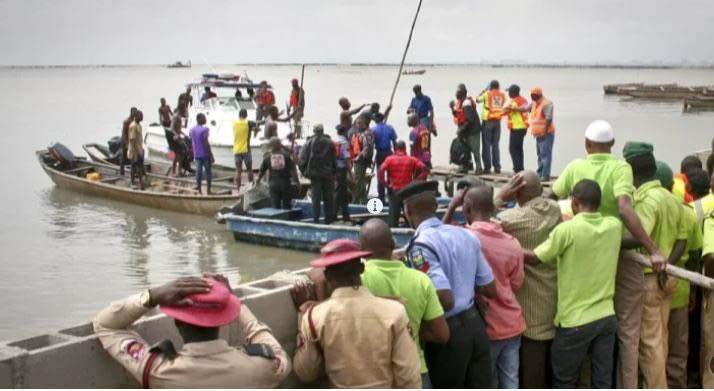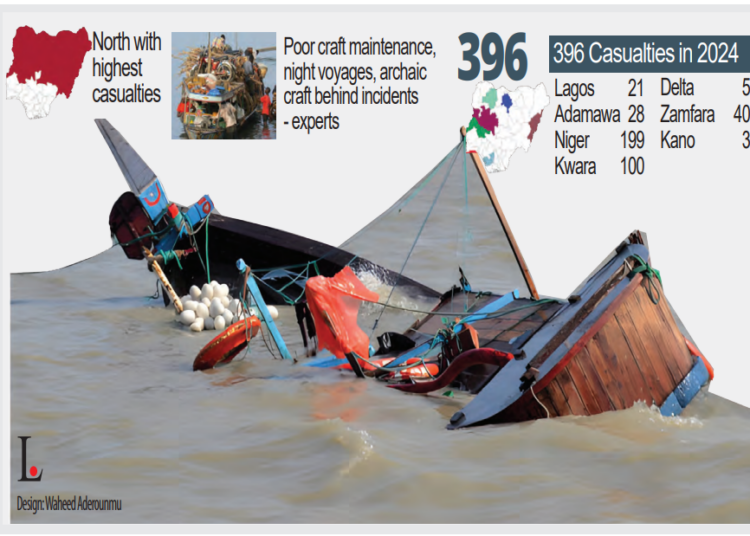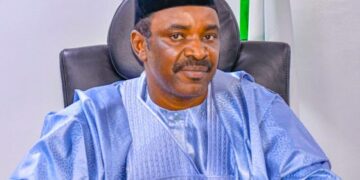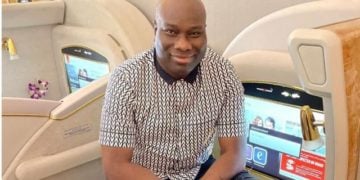About 1,429 Nigerians have died as a result of various boat mishaps in the last four years, LEADERSHIP reports.
Findings showed that northern Nigeria had the lowest water levels but the highest number of casualties, with experts attributing the incidents to poor craft maintenance, night voyages, and archaic craft.
In 2024 alone, our enquiry showed that Lagos experienced 21 casualties, while in a few months and weeks, Adamawa had 28 casualties, Niger 30, Kwara 100, Niger 169, Delta 5, Zamfara 40, and Kano 3.
Such boat accidents often leave a trail of woes in their wake.
On 4 September this year, a canoe travelling between Mayo-Ine and Mayo Belwa in Mayo Belwa Local Government Area capsized, killing two of its passengers. Also, 23 traders and farmers from Rugange village to Yola town died within a space of four days.
In the Yola South area, another incident of boat mishap occurred at Njuwa Lake, killing 15 people.
Last month, 30 farmers died in Mokwa Local Government Area of Niger State as a result of another boat mishap.
A few weeks after that incident, 11 were killed in Gurin, Fufore Local Area of Adamawa State.
In June this year, over 100 people were killed while returning from a marriage ceremony in the neighbouring state of Niger. They were from Patigi, Kwara State.
On 16 September, the Zamfara State Government confirmed the death of 40 persons following a boat accident in the Gummi Local Government.
Also, on 10 April, a boat carrying 12 actors and crew members crashed in Anam River on their way to a location in Delta State, resulting in the loss of five passengers, including a famous Nollywood actor, Mr Paul Odonwodo, also known as Junior Pope.
On 22 August 2024, three people were killed following a boat mishap in Kauran Mata Ward, Madobi Local Government Area of Kano State. Fifteen days into the year 2024, three boat mishaps with over 25 deaths were recorded.
On 7 January, a wooden engine boat capsized and killed about 50 passengers on board.
Also, on 10 January, 20 people were killed while travelling from Andoni to Bonny Island in Rivers State.
Reports say that approximately 100 people were killed in the incidents in the south in the year 2023.
In 2020, about 131 deaths from boat mishaps were recorded in Anambra, Cross River, Bauchi, Lagos, Benue, and Sokoto, among others.

In 2021, 281 people died in different mishaps recorded in Sokoto, Bayelsa, Lagos, Kano, Niger, Taraba, Ondo, and Kebbi.
The Kebbi incident in 2021 in Warrah Village, Tsihuwan Labata, Ngaski LGA, was the deadliest, with 156 people dead.
No fewer than 313 people were killed in 2022, with 216 people also reportedly killed in 2023 as a result of boat mishaps.
How Poor Investment, Low Awareness, Others Fuel Boat Mishaps On Inland Waterway – Experts
To end incessant mishaps on the nation’s Inland Waterways, especially in the northern part, stakeholders have called for greater government participation through investment in modern craft and infrastructure.
Recently, LEADERSHIP reports that about 199 people died in Niger State after a wooden boat ferrying nearly 300 passengers sank on penultimate Tuesday night on the River Niger around the Gbajibo Community.
It was gathered that the boat was returning to Gbajibo from Mundi after the annual Maulud celebration when the ship sank.
However, reacting to the incident, the National Inland Waterways Authority (NIWA), in a preliminary statement, said the incident happened due to overloading and a night voyage.
But to forestall future occurrences, the authority warned boat operators against flouting safety rules, including a ban on night travel and overloading of boats.
NIWA confirmed that the accident involved a wooden boat with about 200 passengers on board. The boat was travelling from Gbajibo Mudi to New Gbajibo at about 8:30 p.m. when it suddenly capsized.
Meanwhile, experts have attributed overcrowding, late-night voyages, archaic craft, and poor craft maintenance as the most common factors responsible for boat accidents on Nigerian waterways.
Speaking to LEADERSHIP, Comrade Tope Fajemirokun, the National President of the Waterfront Boat Owners and Transporters Association of Nigeria (WABOTAN), urged the government in the northern part of the country to invest in Inland Waterways in their respective states.
Comrade Fajemirokun also charged operators on the Northern axis to be open to new ideas about modern ways of running the inland waterways sector of the economy.
He implied that the craft used by the operators is archaic, urging investment and the need for the government to launch sensitisation workshops and campaigns for operators in the region.
“There should be better awareness, just like in Lagos, because I believe there is no better awareness. Also, operators should adapt to new developments, such as in Lagos. Operators there are trapped in their old ways. They should adopt new initiatives and be ready for new ideas.
“Also, the government needs to do a lot, such as media campaigns; the state government must take up the responsibility of building jetties and acquiring modern craft, which shouldn’t be left in the hands of operators alone. The financial capacity is dwarfing the operators. Therefore, the government should come to their rescue,” he stated.
Also, a boat operator who wished to remain anonymous said the high cost of running water transportation in the country is responsible for the ongoing mishaps recorded on its inland waterways.
The operator said significant challenges bedevilling the sector are infrastructure, compounded by fuel pricing, purchasing outboard engines in foreign currencies, and high maintenance costs, which make boat operators cut corners.
According to him, the quality of waterways and environmental factors, security, integrating heritage boating, dredging ecosystems critical to connecting rivers, lakes, and inlets, and land use, which affects the development of waterfront lodges for tourism and the emergence of carefully intended maritime cities and towns, are also responsible for boat mishaps.
“The challenges are enormous, so is the potential. Infrastructure is one; two is the boating and ferry business economy compounded by fuel pricing. The purchase of outboard engines in foreign currency, maintenance, quality of waterways, environmental factors, security, integrating heritage boating, dredging ecosystems critical to connecting rivers, lakes, and inlets, land use act as regarding the development of waterfront lodges for tourism and the emergence of carefully intended maritime cities and towns.
“Others are poor research on inland waterways and the impact of the littoral community’s development and growth, absence of a critical inland waterways master plan, and absence of serious and focal awareness and education,” he stated.
Kwara Governor Announces N100m Support For Kaiama Victims
The Kwara State governor, AbdulRahman AbdulRazaq, yesterday announced a N100m support for the victims of the recent boat mishap involving up to 200 people from Kaiama Local Government Area of the state.
The governor announced the support during a visit to the Emir of Kaiama, Alhaji Omar Mu’azu Kiyaru IV.
AbdulRazaq again commiserated with the Emir and the people of Kaiama, saying the incident underscored the reason for more institutional checks on water travel.
He also conveyed President Bola Tinubu’s condolences to the monarch and the people of Kaiama, stating that the president’s delegation could not proceed to Kwara on Thursday because of the bad weather that prevented them from flying.
“We have come to again register our condolences over the sad incident. May Allah forgive our compatriots who died in the mishap,” he told the Emir.
The Emir of Kaiama commended the governor for his visit and for earlier sending a powerful delegation to the affected community, Gwajibo, led by the Speaker of the Kwara State House of Assembly, Engr. Yakubu Danladi-Salihu.
The Emir said while the incident was an act of God, as no soul can die without His knowledge, it is important for people to respect safety rules such as using life jackets and avoiding overloading and night journeys.
He thanked the governor for the donation and his constant support for the people, including efforts to hire teachers from the grassroots.





